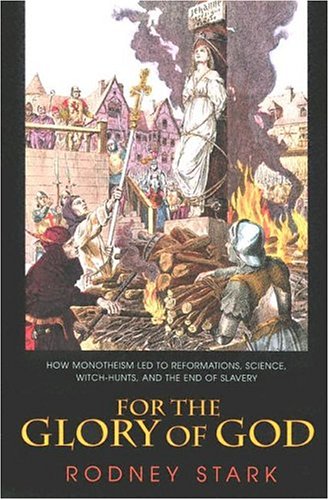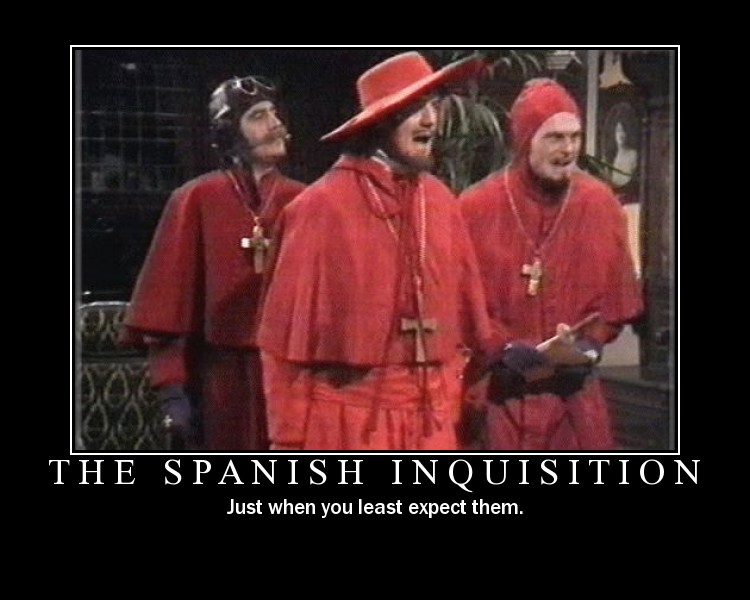WELCOME NOTE: If you’re coming here off a Zmirak link (thanks for the free publicity John!) note that this isn’t a ringing endorsement of the Inquisition, but a setting straight of the record about what it was actually doing and how much (exponentially less) damage it caused (than the black myths would have you believe). I know this is a sophisticated distinction that you’re not likely to catch if you’re reading Zmirak to start with, but can you blame me for trying?
I should also add that while the Inquisition regrettably killed three to five thousand individuals over a period of nearly five hundred years, the Protestant reformers, and the emerging liberal nation-states they backed, managed to kill over 100,000 people, a lot of them “witches” over a period of less than 200 years.
Historical perspective.
==================
The latest piece from John Zmirak has me wondering whether with adherents like him the Church needs enemies of the faith.
The essay “Illiberal Catholicism” read like a farewell to the smoke and mirrors and Spanish ticklers (better than the French ones) of totalitarian inquisitors.
Zmirak’s bold and “objective” assessment of Catholicism’s history reminded me of the following words penned by Rodney Stark in his For the Glory of God: How Monotheism Led to Reformations, Science, Witch-Hunts, and the End of Slavery:

“What I was not prepared for [while researching for this book] was how many of the historians I read to write these studies expressed militant anti-Catholicism, and how few of their peers have taken exception to the litany of contemptuous, anti-Catholic comments, delivered without any trace of self-consciousness. Of course, no reputable, recent historians actually use such self incriminating words as ‘papists,’ or ‘Romanism.’ Instead, they substitute intellectualized equivalents such as ‘enemies of reason,’ ‘benighted scholastics,’ ‘fanatical friars,’ and adjectives such as ‘sinister,’ ‘brutal,’ ‘uncomprehending,’ ‘cruel,’ ‘repressed,’ and ‘totalitarian.'”
I’ll refrain from going after most of the black legends Zmirak recounts verbatim from the Reformation and the Enlightenment–it’s not worth the effort. But if you want a robust rebuttal of the myth of “Catholic historical totalitarianism” you can look into another Stark book with a long subtitle, The Victory of Reason: How Christianity Led to Freedom, Capitalism, and Western Success. The reasons why I’m not as aroused by Western success and classical liberalism in the way Zmirak and Stark are a topic for another post.
I feel compelled to address a much more pressing matter: the good name of the Inquisition!
The “Zmirak equation” [RCC – Enlight. = Inq.] is what offended me most as someone with a history degree:
“We ought to be deeply thankful for the heritage of the Enlightenment — because the American anti-Catholics of the 19th and 20th century were dead right about one thing: Catholicism minus the Enlightenment equals the Inquisition. Do I exaggerate? Consider the fact that during the Spanish occupation of New Orleans, before the Louisiana Purchase, an officer of the Inquisition was interrogating heretics and collecting torture equipment — which he never got the chance to use, thank God.”
Curiously enough, talking smack about the Inquisition is the chief example of anti-Catholic misinformation Stark gives in For the Glory of God:
“Although most living historians are probably not prejudiced against Roman Catholics, or at least not more so than against members of any other faith, most hold false views that they do not know to have been the product of the anti-Catholicism of previous generations. For example, aside from a few specialists, most historians still seem to assume that the Spanish Inquisition burned large numbers of heretics, witches, Marrano Jews, and other deviants in public autos-da-fe, and that to have fallen into the hands of the inquisitors was an almost certain sentence of death. All false!”
In the chapter “God’s Enemies: the European Witch Hunts” Stark gives a detailed account of how the Inquisition was the chief brake upon mob violence during the late middle ages and the start of modernity. He doesn’t spare you the numbers, but they’re too numerous to recount here. You’ll have to do your own research.
I’ll limit myself to liberally lighting the flicker of your intellect with the following words from Stark:
“In fact, the various Inquisitions (there were many independent regional and national Inquisitions) were far more likely to acquit or to give mild sentences than were the secular courts. Moreover, as will be seen, in places where the authority of the Inquisitions was greatest, such as in Italy and Spain, most accusations of witchcraft were dismissed without trials, and the very few of those convicted were executed. Indeed, in 1550 the Inquisition in Catalonia, soon supported by other Inquisitions in Spain, attacked the evidential basis of witchcraft trials and opposed all further prosecutions–this is at a time when the most furious and ferocious period of witch-hunting was just beginning elsewhere [among the Protestants].”
You read that right. Ave inquisitores!
In case you missed it, the most “furious and ferocious” phase of witch-hunting took place in Protestant lands after the Reformation because they lacked a central authority like the Inquisition to impose its will upon murderous populations embroiled in mimetic contagion.
Let’s pray Rome may still save us from the illiberal excesses of the income gap, pollution, political agonism, abortion, the divorce plague, and consumerism. Given the liberal overcrowding of American prisons, maybe it would be most rational for the US to call in l’inquisition douce? [More on Zmirak in tomorrow’s post on (what else?) Islam right here.]
Meanwhile, watch this documentary film from the BBC. It will prove to you that everything you think you know about the Spanish Inquisition is wrong. Remember, if you keep spreading lies to score points against your opponents, you’re part of the problem.












